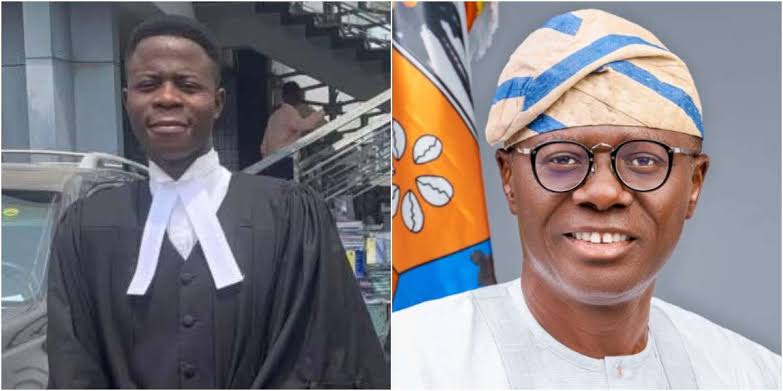693
By Lizzy Chirkpi
Human rights lawyer, Festus Ogun, has taken legal action against Lagos State Governor, Babajide Sanwo-Olu, accusing him of infringing on his fundamental rights by blocking him on the social media platform X (formerly known as Twitter).
Ogun filed the suit marked FHC/L/CS/1739/25 at the Federal High Court in Lagos, a development he announced Friday via his Facebook page. He alleges that the governor blocked him in 2021 after he issued “constructive criticisms” and demanded “accountability” over the October 2020 #EndSARS protests and the reported killings at the Lekki Toll Gate.
“In 2021, I noticed that the Governor blocked me on his official X handle @jidesanwoolu owing to my constructive criticisms of his policies and demand for accountability in respect of the October 2020 #EndSARS Massacre,” Ogun wrote.
According to him, being blocked has cut off his access to important public information and updates from the government.
“Blocking me on X has prevented me from accessing public updates and receiving information about policies and governance in Lagos, which constitutes a violation of my right to receive information without interference,” he added.
In the originating summons, Ogun is asking the court to declare Governor Sanwo-Olu’s action as “unconstitutional, arbitrary, and discriminatory.”
“A declaration that, as a democratically-elected public office holder in Nigeria, the Respondent (@jidesanwoolu)’s blocking of the Applicant (@mrfestusogun), a citizen of Nigeria and resident of Lagos State, on X (formerly ‘Twitter’) is wrongful, unconstitutional, arbitrary and constitutes a gross violation,” the court documents state.
Ogun is also seeking an order compelling the governor to unblock him, issue a public apology, and refrain from blocking other citizens on social media platforms for expressing dissenting views.
He further demanded “an order of perpetual injunction restraining the Respondent, his agents, privies or any other person or entity acting through or on his behalf, from further blocking the Applicant on X or any other social media platform.”
Describing the emotional toll the incident has taken on him, Ogun said, “I feel haunted, traumatised and emotionally disturbed.” However, he emphasized that the case is not about personal sentiment but about broader democratic values.
“This suit is not just about me. I have filed this lawsuit in furtherance of public interest and with the hope that it sets a precedent in our digital rights jurisprudence,” he explained.
The lawyer also urged the Nigerian judiciary to consider similar legal precedents from abroad, particularly the U.S. case of Knight First Amendment Institute v. Trump, where the court ruled that former President Donald Trump violated the First Amendment by blocking users who criticized him on Twitter.
“I invited the Nigerian court to be persuaded by the decision of the US District Court in Knight First Amendment Institute v Trump where President Trump was found to be in violation of the 1st Amendment when he blocked US citizens for criticising him on Twitter,” Ogun said.
He concluded with a warning on the dangers of silencing criticism in a democracy. “Intolerance to criticism and accountability is unconstitutional and undemocratic. Nigerian authorities continue to crack down on dissents, critics, journalists, bloggers and vocal citizens on social media using arrests, detention, surveillance, collusion with big techs and outright blocking, as weapons. That narrative must stop,” he stated.



